Starting your business
Virtual coffee with a student 2022-09-27
Through our lives, we depend on other people’s services. From our birth, thanks to the midwife, to our death, thanks to the undertaker, and in our long years between, we inescapably depend on thousands of people who come to our service.
Most of the services that upkeep our lives come from government institutions — our education, hospitals, law courts, legal supervision by government that public and private services alike may be safe for us. But the just as indispensable services that we need for our lives come from private businesses.
Many private businesses that come and make themselves indispensable to our lives have brought not only service, but have brought life’s joy to us — the mom and pop corner store, the music store, the cell phone, these provider businesses are so diverse and numerous they need not be summarized.
There are businesses created 50 years ago, even spectacularly more than 100 years ago, so successful, they are integrated into our lives today and into the future, we can think of Coca-Cola, Levi’s jeans, the newcomer Microsoft. Far greater, many businesses have come and disappeared. But no matter success or failure, a same backbone lies behind them all, it is that all businesses are created by individual persons.
In this article I bring together the resources a person needs to start a business, resources that will help a person to succeed in his/her business, with note that, without these resources, a business will have much more difficulty to succeed.
In my career of 45 years, I observe that a business, either small or highly professional, both are considered by the same resources, and the success and failure of a small or highly professional business are both commanded by the strength or lack of strength of these same resources.
In the resources as below, all the 10-in-all attributes contribute to the success of a business. 5 attributes, society’s need, family, people connection, finance, intelligence, might be not under our subjective wish, or depend somewhat on the conditions we are born with. But 5 attributes, education, calling, knowledge, organizing, helpers, are very much within our subjective control. By this perspective, the success of a business is not totally up to our wish, and then, success is also up to our hard work.
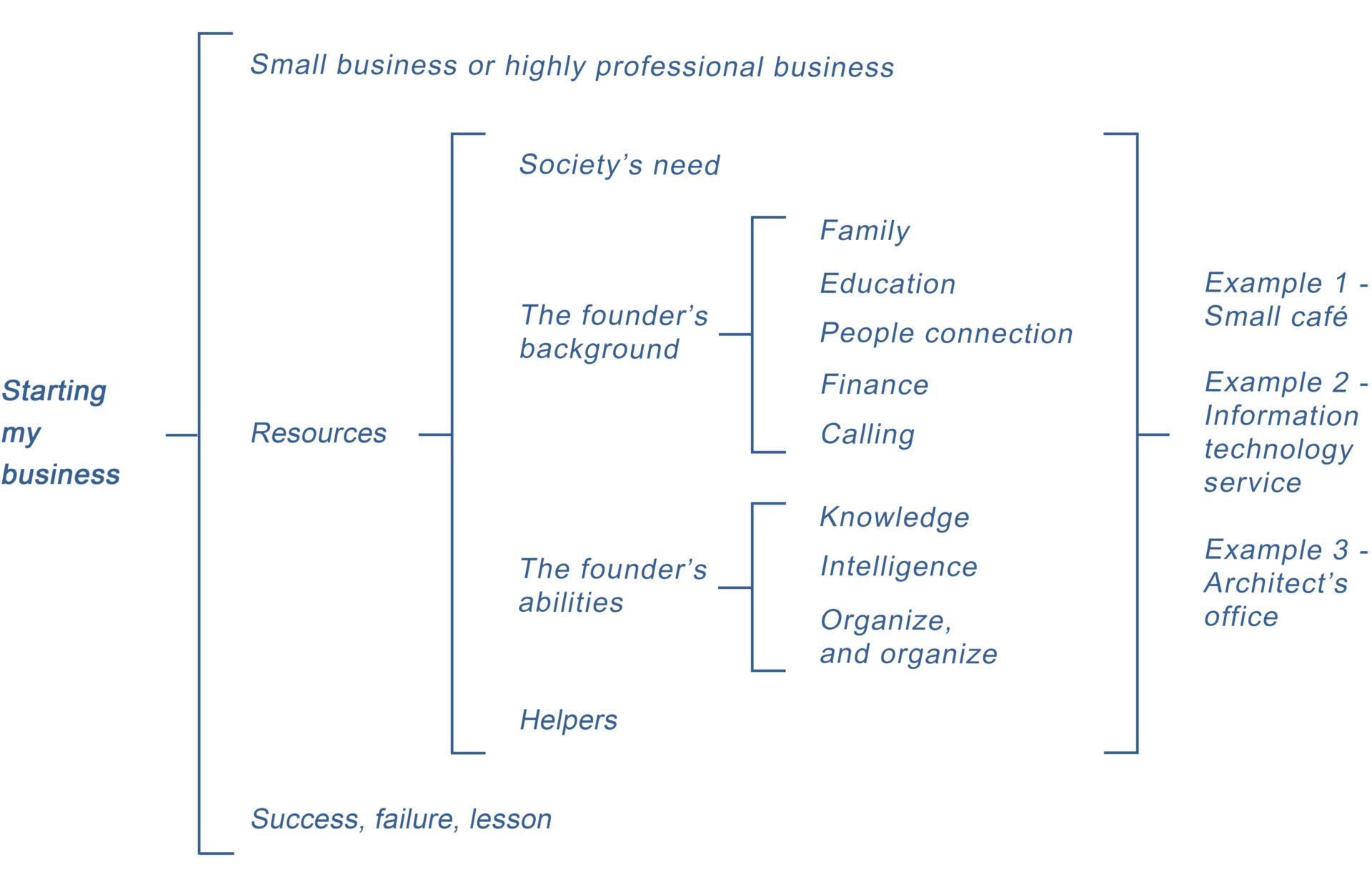
Society’s need

We know the iron rule of business: demand and supply must meet. But this law is relevant only in a macro economy. An analogy is, the sea in the ocean must move in a general direction, but there will be sea fluctuations in local situations. In business demand and supply there is a general common movement, but local fluctuations of demand and supply may vary.
If you think about starting a business, it is foolish if you do not think whether society needs your particular service. To foretell whether society needs your service, you need to understand general society, and understand the particular place where you want to set up business. Trying to foretell society’s need is a formidable task, and even hard business people have been wrong in foretelling.
But understand society we must, for both hard business people and amateur people.
I suggest that we can cut away fruitless speculations of society’s need, and focus our task, if we follow 4 rules below.
(1) Truly understand society — To understand society’s need is in fact just one part of our seeing the world, and seeing the world in turn depends on our perception power. Perception power is an important subject connected to the core of each of us, and is outside the subject of this article. In simple note, perception, open-mindedness, and a healthy mind are closely related, and we can learn to improve them. When this part of us is in good state – part of a healthy life – we see the world clearer, and we understand better society’s need.
(2) Listen to your inner voice — Life has two gifts to us: our reasoning mind, and our intuition. Many times in life, complex situations are not only seen and resolved by reasoning, they are better seen and resolved by our intuition. Similarly in a business, we rely not only on reasoning, but also we need to listen to our inner voice. Many times it is in fact our inner voice that guides us to a correct understanding of life – and correct understanding of business.
(3) Sell only service that does good to society — In meeting society’s need, there are 2 services that never go wrong. One is that we sell service that does good to society. If we examine, we will see a simple and profound truth of life, that general society only wants one thing, both from life and from business: something that does good to society. If we examine the successful and well-known businesses in the world today, we can see that all of them indeed do something good to society.
(4) Sell life’s joy — Same as the argument above, it is a simple and profound truth, that all the general public people want, both from life and from business, is something that gives them life’s joy. We need to consider, does our business give them life’s joy?
A useful rule is, we look at whether the item we wish to sell will give ourself joy and happiness. If it gives ourself joy and happiness there will be a good chance other people will enjoy it too. If it does not even give ourself happiness, there is no chance other people will enjoy it.

Founder’s background
In starting a business, our background resources will foreshadow a great part of the conditions that will point to our business’ eventual success or failure. I put together here 5 background attributes. 3 of them, family, people connection and finance, might not be under our subjective wish, or depend somewhat on the conditions we are born with. But 2 attributes, education and calling, are very much within our subjective control.
I particularly note that, 2 attributes, people connection and calling, matter greatly in our eventual business success.

In family influence, there are 2 types of people. One type is the individual who is born with particular strong characters. The particular strong characters point this person in his/her eventual life path, regardless of his/her family. We can think of the computer master Steve Jobs, the science master Stephen Hawking, the King Elvis Presley.
The second type is the more common person, whose career is ultimately influenced and shaped by his/her family background.
In my career encounters, I have seen these 2 types of persons, and outside influences ultimately do not change their career destiny.
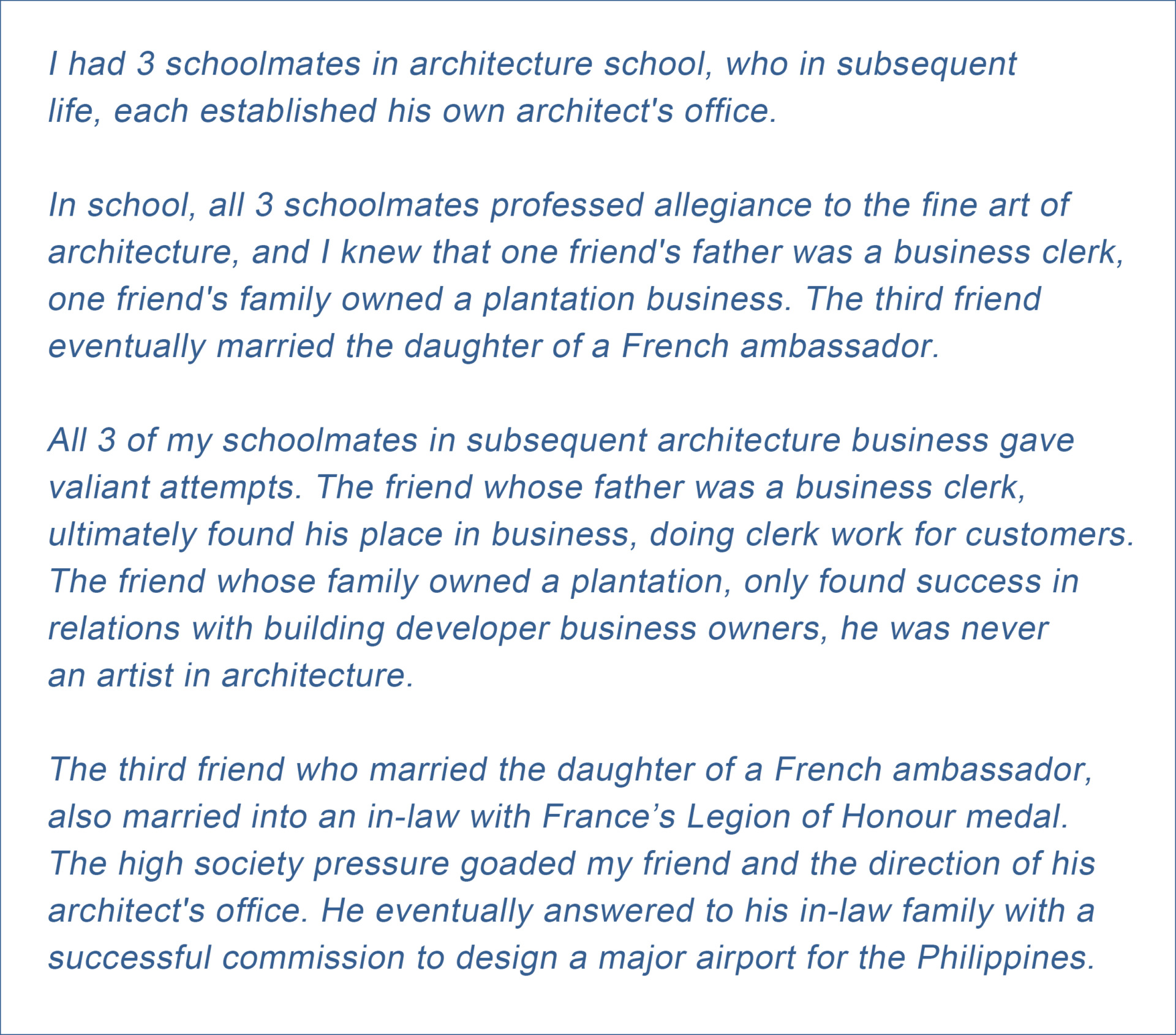
If your family background is poor, and you do not have particular strong characters to be independent, what do you do?
This is when life’s lesson comes into presence. If you are conscious that you want to get ahead in the world, that means you already have a calling for independence in you. When you do not have family resource, and not enough inborn strong character, that means you have to work harder, sometimes much harder, than people more fortunate than you. This is life’s lesson, and sometimes it can be a long test. If you in your own way find your inner voice and perseverance, there will be a day when you find you have grown stronger and ahead. This hypothetical life’s lesson is actually part of sections “Calling” and “Success, failure, lesson” in this article.

Usually, we enroll in a school to learn specific education for the career that we desire. But in our subsequent career life, we are not only shaped by our specific technical education, we will be shadowed by the spirit of the school that we spend time as student. Like our personal family, the schools we go to as students not only build us in technical knowledge, but they infiltrate to us the particular spirits those schools embody. In our subsequent business career, the characteristic spirits of our old schools will, in not obvious way, but they are there, influence the what and how of our business.


In business, people connection is topmost important. We start a business to begin with, to find people to buy our product. People connection in business is so important that highly professional firms have partners on exclusive duty finding customers. Whether you start a grocery store, or an architect’s office, your first and forever concern is where to find customers.
Even before you start a business, you need to make sure that when you start, you will have people connection.
Different types of business have different people connection interface. For example, a shop in a building attracts people passing by; a professional office attracts people through word-of-mouth recommendation or internet advertisement. Depending on your business type, you need to identify your particular people connection interface.
When you identify your people connection interface, it is time you put sustained hard work into that interface.
For example, if your interface is a shop in a building, you really need to know something about the fine art of attractive shop design. If your interface is through internet advertisement, you really need to know how to set up your own website, how to effectively connect through public platforms, how to search and write to prospective customers.
Behind you starting a street shop or a computer work business, it is paramount to note that your business product must meet society’s need outstandingly, for your business to ever survive.
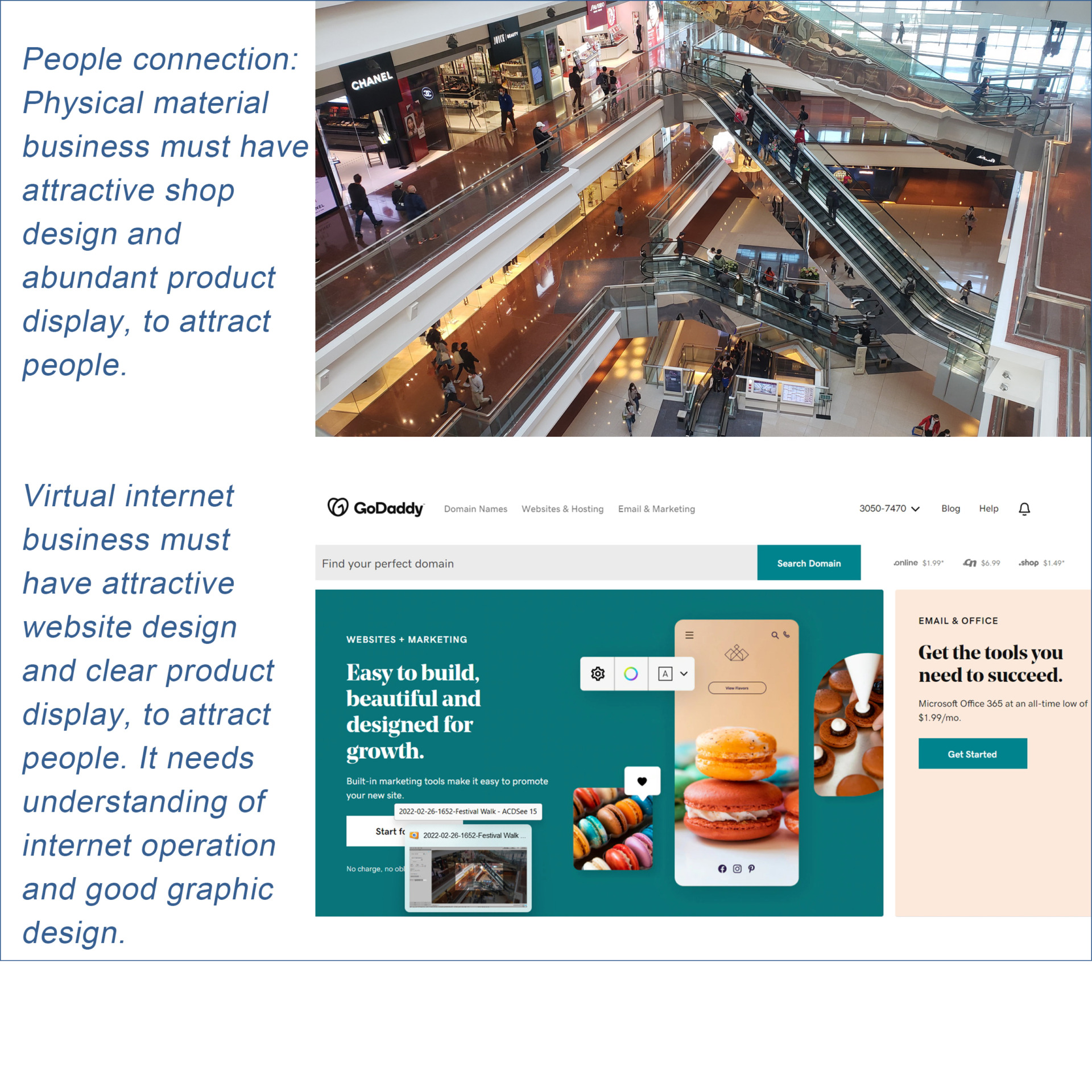
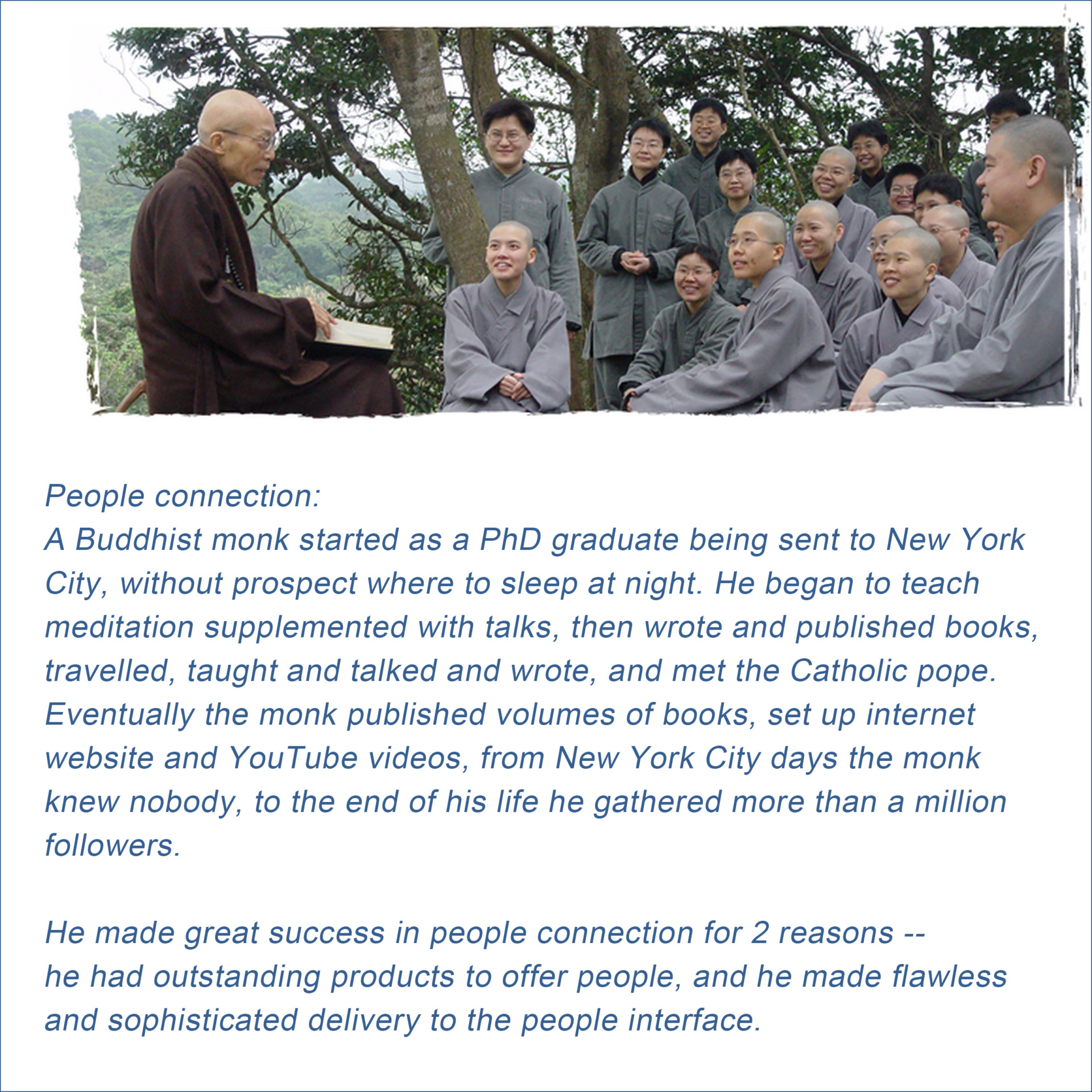

There are really just 2 types of business, and 2 types of finance. One type of business is selling of our brain power. At the lowest material expense, we invest in our brain power and put in close to no material expense. 2 types of professionals belong to this brain power business: one is artists, that include musicians, movie actors, writers, and to a degree, architects. Musicians pay for music material like pianos but no other expense; movie actors pay for no material expense at all; most importantly they sell only their brain power. The other brain power professionals are computer work people, that include web page designers, computer drawing technicians. These people pay for their computers and perhaps office rentals and some staff salary, it is only brain power that they sell.
The second type of business is selling of physical materials, that include retail shops and restaurants. This type of business must require shop space rental, paying for wholesale products before they sell, product waste if they do not sell, and staff salary even before the business earns profit, they are unavoidable material expense.
The most important consideration related to business expense is, whatever business we choose, whether the business will return financial profit to us. Whether we start a brain power business or a physical material business, we must consider before we start, an alternative way to earn money, if eventually the business that we plan fails.
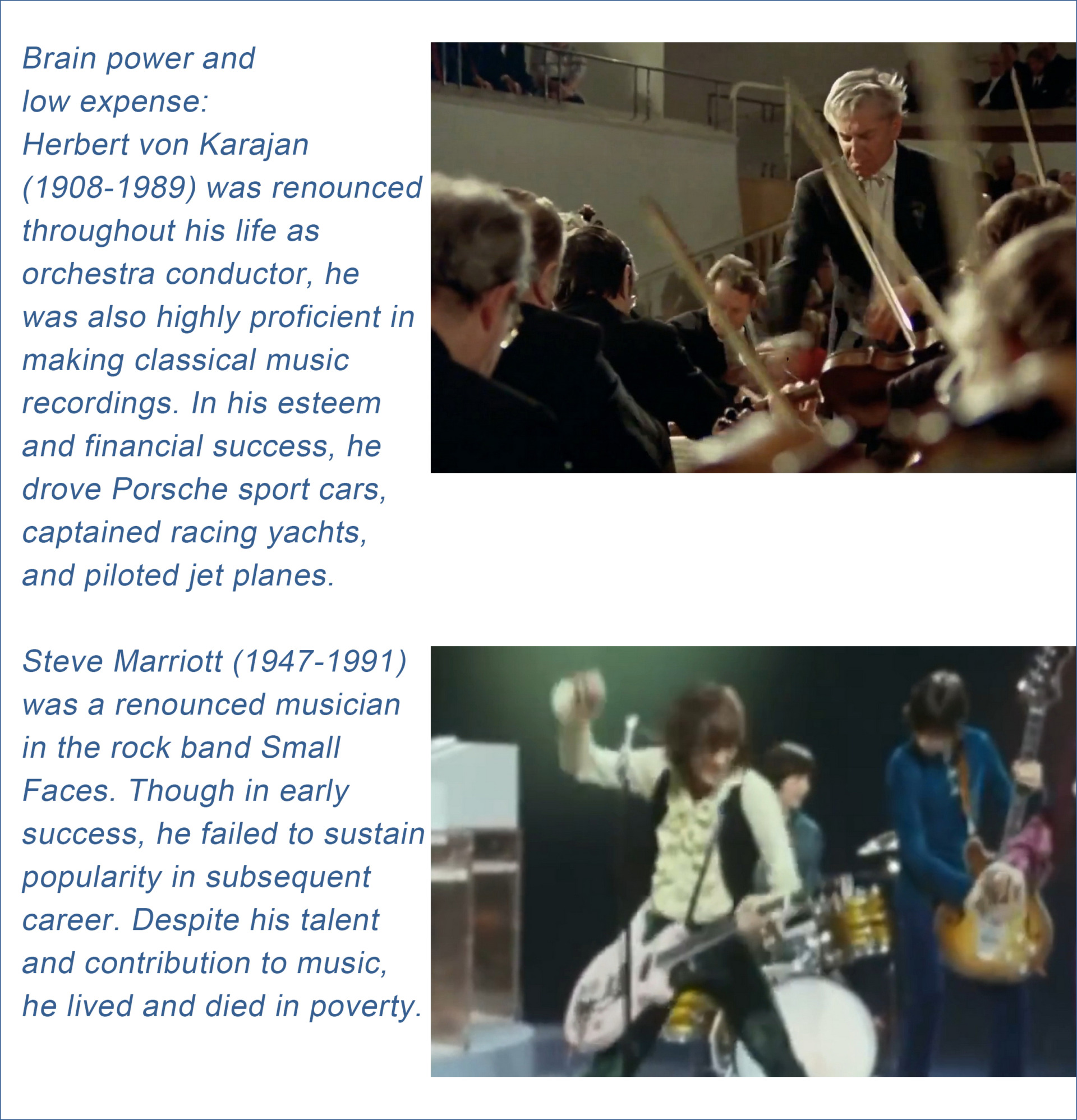

Calling is when we hear an inner voice telling us there is something we need to do. A business is an important venture that needs a strong feeling of suitability from our inner self. Calling, together with making sure that we will have people connection, are 2 topmost considerations we need to feel comfortable about, before we begin other planning for a business we are thinking of. It is a truth that, when we feel a clear and true calling, the calling will sustain us in difficulties and hardship during our road toward achievement.
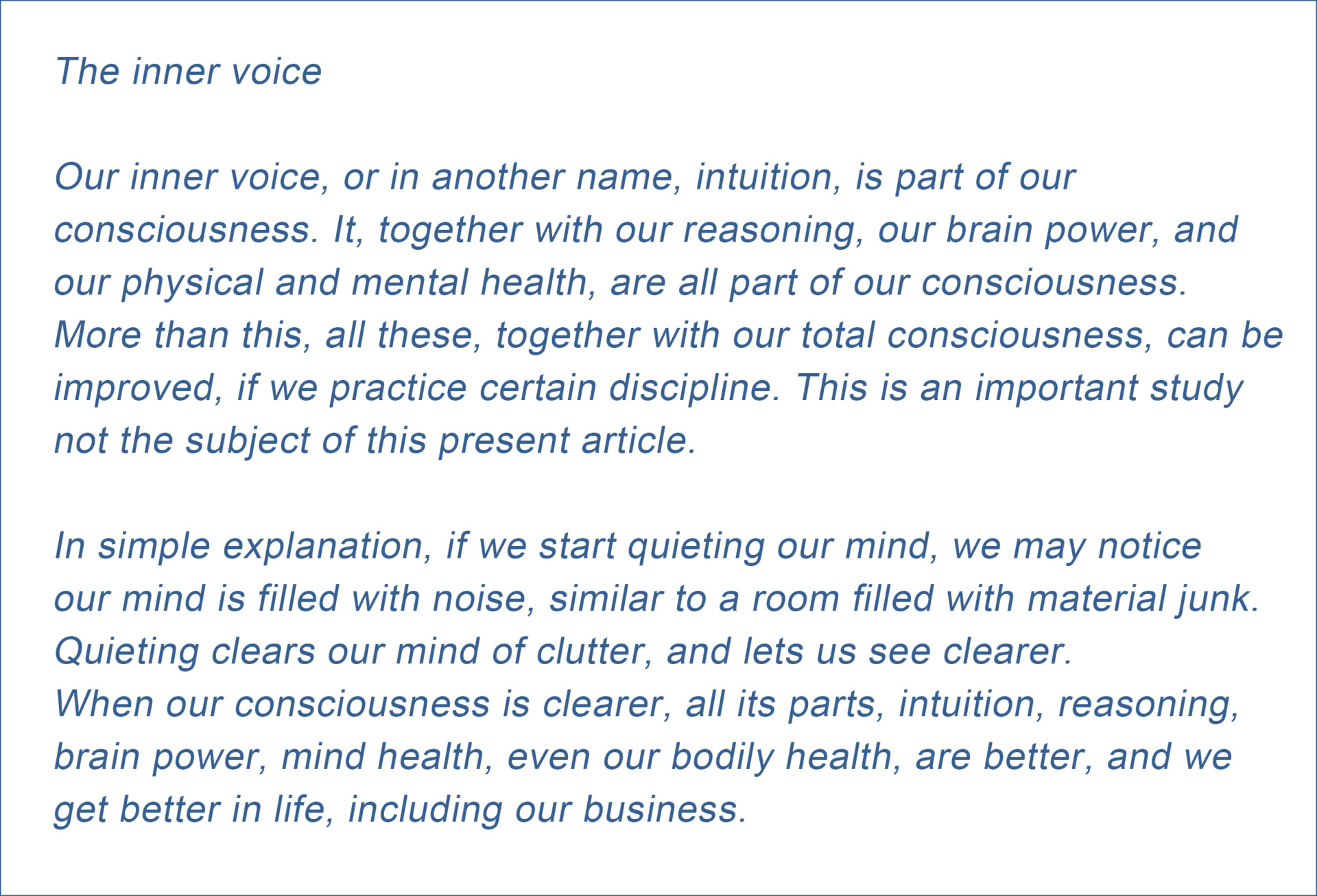
Founder’s abilities

The previous section “Founder’s background” discusses what you prepare before you launch a business. This section “Founder’s abilities” discusses what you do after you launch a business.
Knowledge is your specialist knowledge about your business, intelligence is your ability to resolve problems, organize is the duty on you the business founder to set the business in practical order.
On the 3 attributes, I advise 2 notes:
(1) Our human world unfortunately is riddled with negative human characters, consisting ego competition and different types of desire competition. When you are the head of a business, your business knowledge, ability to resolve problems, ability to organize, are constantly put to judgement by everyone, including customers, your staff, and any armchair judge. But ultimately, hardship is good, because hardship molds you into a stronger person.
(2) Your business needs to be organized constantly and repeatedly, order is paramount for the survival of a business. 2 ends, material business and your thoughts, both depend on constant refreshing and upgrade for your business to adopt and succeed.
Helpers

When you start out on a very small business, it is good and pleasurable for 1 or 2 good personal friends to help you. When you are a corporate with established business systems, it is necessary and efficient for people from walks of society to work in the corporate, with benefits mutual for corporate and employee.
However, when your business is small to medium, and you wish to hire helpers to expand your business, you need to be very careful. First, helpers from society are more likely ordinary people, with different types of shortfalls, you do not know about them. Second, helpers do not know about you. It is trial and error for you and the helper, and the burden is more on you to understand and guide the helper. I have seen countless businesses where employers, without exception, expand far more energy than their employees, day in and day out in work.
But in the end, your work is not in waste. If not helping your business, you are helping society by helping an employee in life.
Example 1 – Small café


There are different reasons people open a café. Some people do not want a constricting employee job, and want the freedom to control their own lives by running their own business. Some people may love coffee or particular types of cooking, or want the relaxing life associated with a café.
But there is a price to pay for the attraction of owning a café. A café needs upfront payment of shop rent, shop design fee, construction work, furniture, cooking and beverage equipment, raw food, unsold food waste, staff salary, and all these are upfront payment before the café sells anything. And there are numerous café competitions.
But for the customer, there is only the gain of a potentially relaxing and pretty place with good coffee and good food. For the owner, there is reward on seeing a business well run and seeing people like to come into the café.
I put together 3 conditions a café needs to survive and succeed.
Location is where a consistent amount of people, and consistent type of people, will always pass by. Foremost, a café needs to be very careful in location so that it is seen by a good amount of people, and the right type of people.
A café really needs some complementary food beside beverage for a satisfying experience for the customer. Not a full restaurant, food in a café should be small in selection, and chosen in exquisite dish type and cooking quality. For example, pizza is good complement, but outstandingly made pizza.
Many café owners know to seduce the appetite of the people passing by. Pretty shopfront, relaxing interior, wooden stands displaying menu, kitchen open to public view, attractive table and seats front of the café, the more seduction the better.
McDonald’s is the giant corporate running a café supplement. The corporate has chosen that its cafés be as basic as possible while using its Big Macs to give customer a basic satisfying experience. But McDonald’s advantage against all competition is its domination of every good location on earth.
Starbucks is a business that I cannot understand. The coffee is standard, selection of pastry is limited and too sweet, tables and chairs and interior are bare. Somehow an image of Starbucks being higher class than McDonald’s is built up, and I see relatively dressed up people inside with a laptop, it is something I cannot understand.
There is a small café in Thunder Bay, Canada that offers healthy and colourful vegetarian food and beverages. I can see that it is run by ladies who obviously love cooking. The winning part of the café is its menu of unlimited selection and fresh healthy food, though the owner probably suffers greatly by being unable to find a successful shop location.
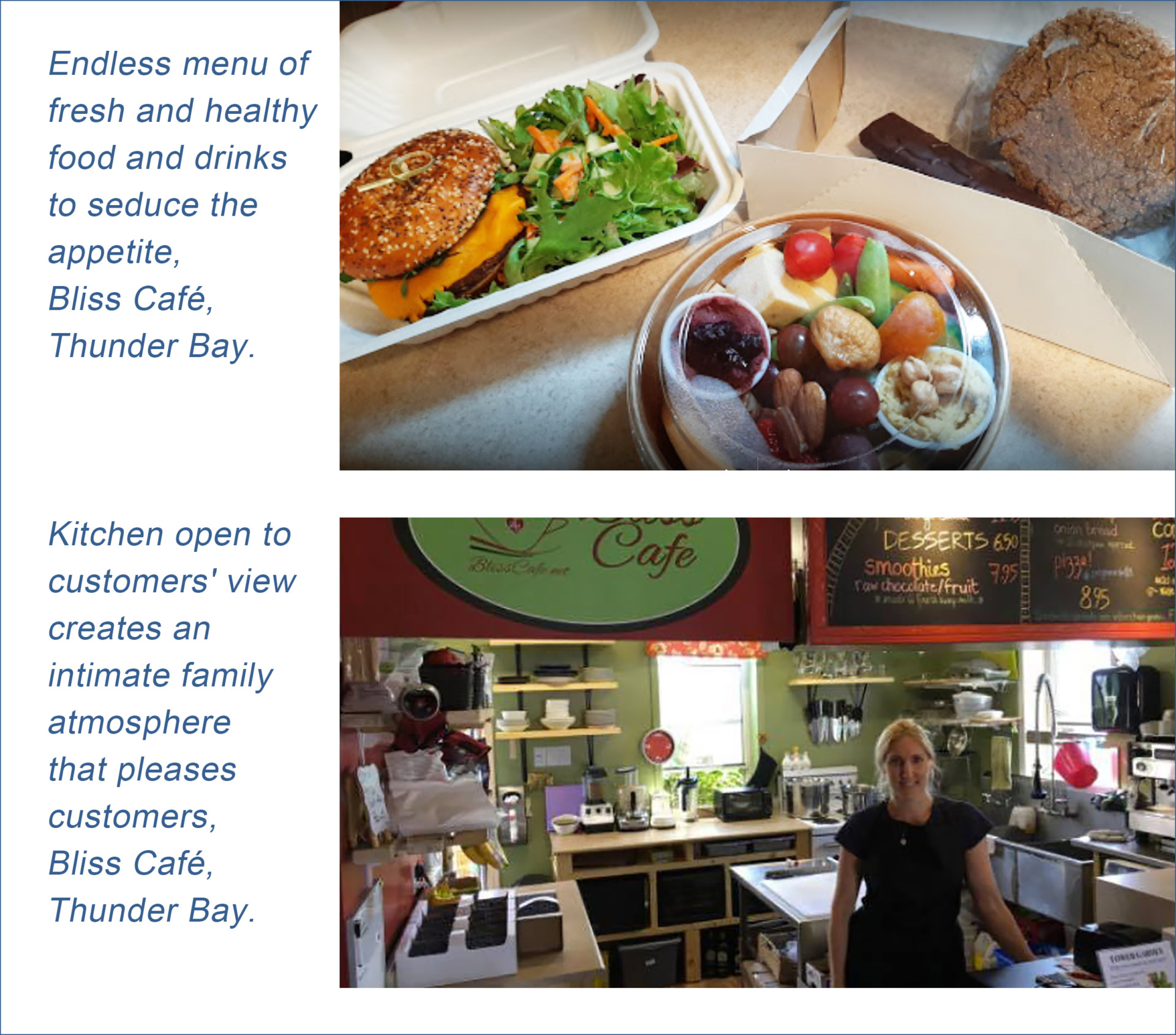
Example 2 – Information technology service


Information technology is the technology of passing on information, examples are website building, computer drawing, and any computer software. A business that sells such services requires from its founder highly specialized knowledge, i.e. brain power, but little to no material and monetary expense.
In 1980 to 2020 there was a tremendous building boom in China, and there was tremendous demand for architects, building contractors. Following this, there was also urgent demand for computer rendering for architects, website building for architects. In this overheat, a curious phenomenon developed, when numerous college grads banded in small groups of a few people, rented a cheap place, moved in personal computers, and started businesses of providing computer renderings or website building for architects. Money was made for young people, but the business could only sustain while building boom last.
In western countries there is no building boom, such businesses do not have the stimulus to start. We may see such building boom and economy is artificially created and not self-evolved or safe, which economists have long warned.
If you think of starting a business in information technology, 2 pre-conditions are among the essential and important.
First, you need to sell information technology that meets society’s exact need. There are 2 parts to this. One is that you need to understand what society exactly likes to see, for example if you develop a computer operating system, you need to understand what the general public exactly likes to see in an OS. It is your guessing, but the more exact your knowledge what the general public wants to see, the more likely you will succeed. The other part is, pairing with what you think society wants, you develop your product to high specific detail. Examples of products that both guess what society wants, and sell in highly defined details, are Microsoft Windows Version X and Apple cell phone Version X. This is a test of your mental ability, after all, this is the pre-condition of the business.
Second of the pre-conditions, your previous employment in the field is important, because you learn how established businesses manage the things you are interested in, in real world situation. Bill Gates, with personal brilliance, yet worked in Honeywell and IBM, and probably learned from them. For us more common people, employment in other people’s business is invaluable teaching for us.
Selling one’s invention is also selling information technology. Examples are computer software that we cannot live without today, Photoshop and AutoCAD, both were invented by individual persons in the 1980s, and subsequently sold to company with development muscle as Photoshop was sold to Adobe, or found partners with development muscle, as AutoCAD did. However, a most important rule holds, as you develop a hopeful invention, you need to understand the 2 pre-conditions noted above, to make your invention undeniably wanted by society.
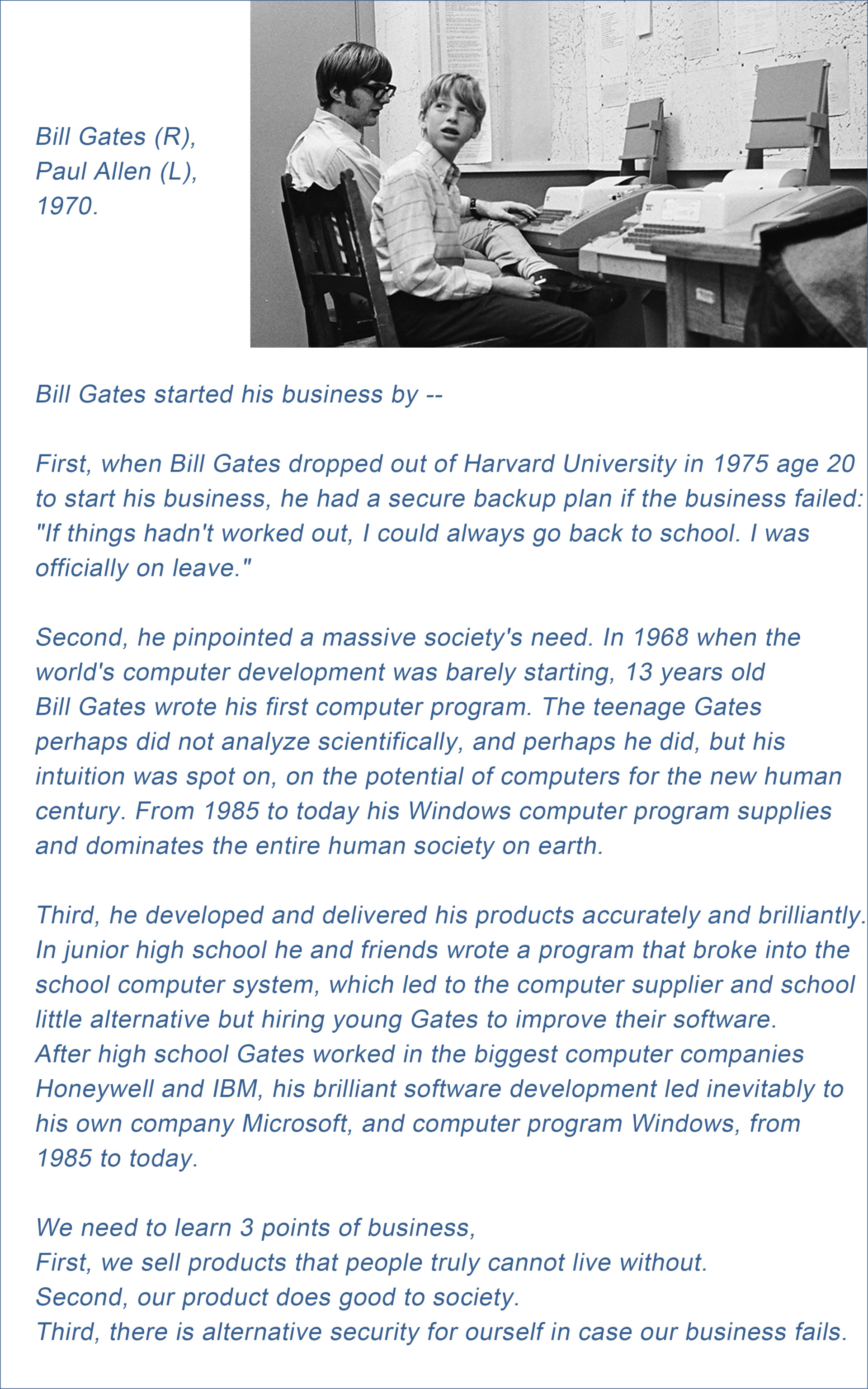
Example 3 – Architect’s office


Architect’s office work includes knowledge and resolution of intimate human use, intimate space design, drawings, building laws, structure and building services inclusion, industry manufacturing and assembly, building costs, deadlines, customer and colleague relations, cultural history, and beauty. On top of this, society wants to see buildings that please society, and to see buildings that become humanity’s monuments.
This work requirement is not exaggerated, and it is therefore not surprising that the majority of architects, being ordinary people, cannot fulfil them all.
The work complexity makes evident, for an architect to open an architect’s office, his/her full personal resources will be taxed; family background, education, people connection, finance, calling, knowledge, intelligence, organization, helpers.
On top, few architects’ offices make financial profit, and all architects with no exception toil under workload.
Yet with finance and work pressure, no architect is known to quit his/her career. There has to be an incentive to this; it is in the meaning of the work, which is above and outside of the category of business.

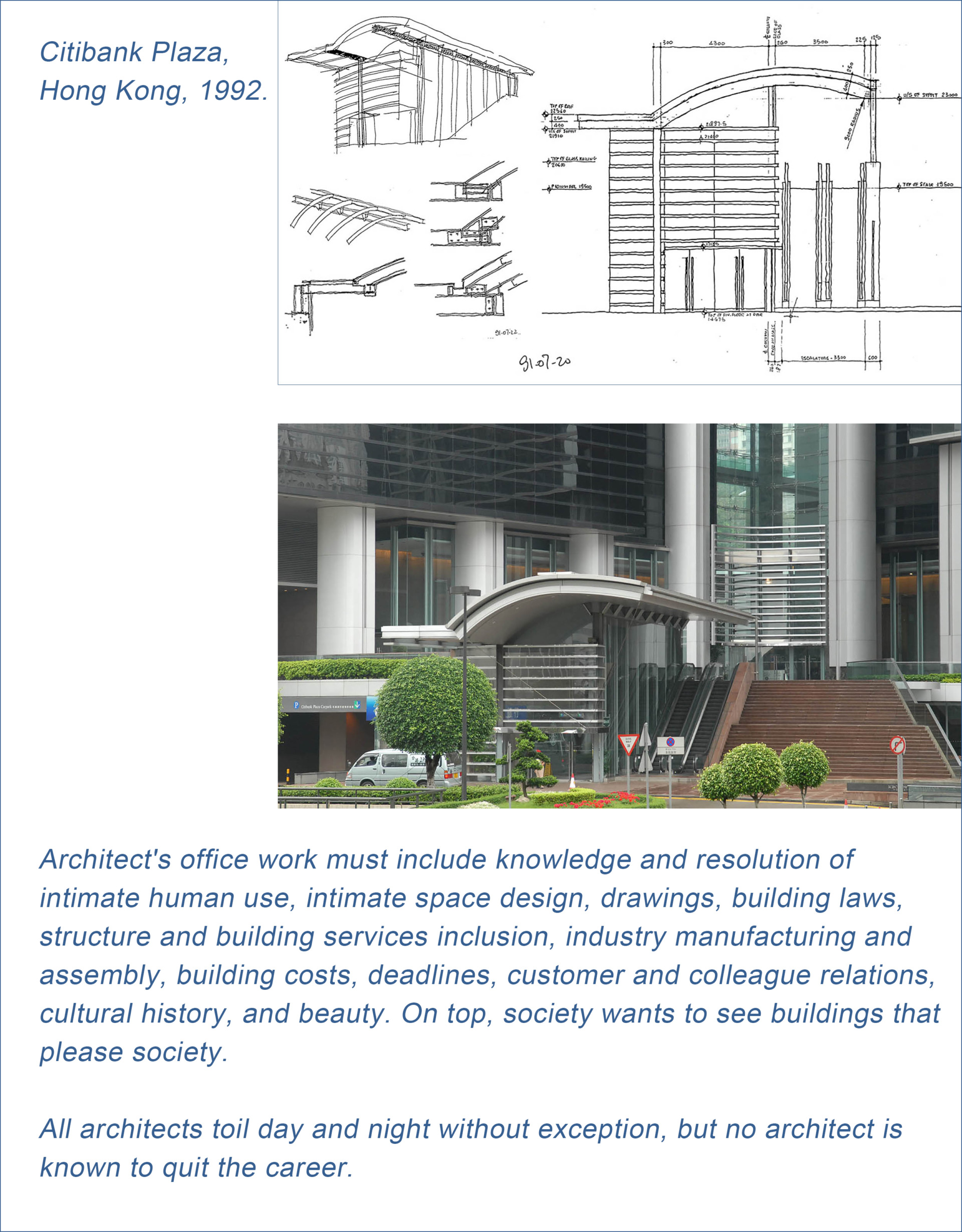
Success, failure, lesson

We may say that a yardstick of business success and failure is whether a business makes or loses money. But we need to know that there are different yardsticks of business success and failure, in the end more lasting and more worthwhile than money.
We may say that a first yardstick is, whether a business accurately predicts society’s need, and the business product meets society’s exact need. This is a most satisfying confirmation of a business.
A second and equally worthwhile yardstick is, a business founder’s abilities, knowledge, intelligence, organization, the founder’s background, education, calling, all or most of these abilities are proved useful and successful for the business. This is a no less satisfying confirmation of the business founder’s worth.
A no less worthwhile yardstick is that a business can simply go on. In common society, that a business can go on, is a confirmation of success.
Whether our business can go on or not, we need to know that there are 2 yardsticks as worthwhile as the above, ultimately more worthwhile. One is that we know we are contributing to society. One is that our business venture has made our person grow.
In fact, all of these are life’s lesson for us, and when our person grows, that is life’s ultimate best gift to us.